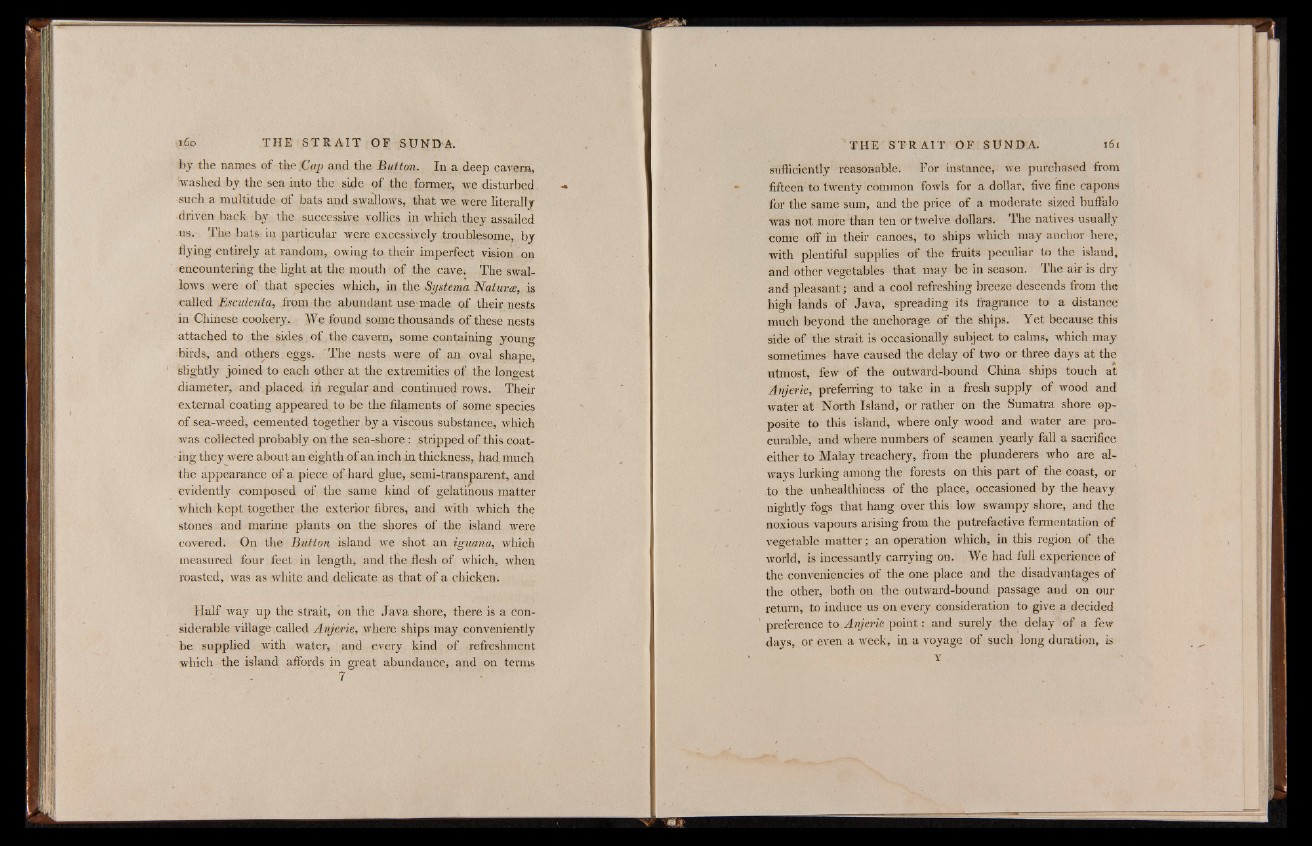
i6o T H E S T R A I T OF S U N D 'A .
by the names of tire Cap and the Sutton. In a deep cavern,
washed by the sea into the side of the former, we disturbed *
such a multitude of bats and swallows, that we were literally
driven back by the successive vollies in which they assailed
us. The bats in particular were excessively troublesome, by
flying entirely at random, owing to their imperfect vision on
encountering the light at the mouth of the cave. The swallows
were of that species which, in the Sy sterna. Natur.ce, is
called Esculent a, from the abundant use-made of their nests
in Chinese cookery. We found some thousands of these nests
attached to the sides of the cavern, some containing young
birds, and others eggs. The nests were of an oval shape,
slightly joined to each other at the extremities of the longest
diameter, and placed in regular and continued rows. Their
external coating appeared to be the filaments of some species
of sea-weed, cemented together by a viscous substance, which
was collected probably on the sea-shore : stripped of this coating
they were about an eighth of an inch in thickness, had much
the appearance of a piece of hard glue, semi-transparent, and
evidently composed of the same kind of gelatinous matter
which kept together the exterior fibres, and with which the
stones and marine plants on the shores of the island were
covered. On the Button, island we shot an iguana, which
measured four feet in length, and the flesh of which, when
roasted, was as white and delicate as that of a chicken.
Half way up the strait, on the Java shore, there is a considerable
village called Anjerie, where ships may conveniently
be supplied with water, and every kind of refreshment
which the island affords in great abundance, and on terms
7
TH E S T R A I T OF S U N D A .
sufficiently reasonable. For instance, we purchased from
fifteen to twenty common fowls for a dollar, five fine capons
for the same sum, and the price of a moderate sized buffalo
was not more than ten or twelve dollars. The natives usually
come off in their canoes, to ships which may anchor here,
with plentiful supplies of the fruits peculiar to the island,
and other vegetables that may be in season. The air is dry
and pleasant; and a cool refreshing breeze descends from the
high lands of Java, spreading its fragrance to a distance
much beyond the anchorage of the ships. Yet because this
side of the strait is occasionally subject to calms, which may
sometimes have caused the delay of two or three days at the
utmost, few of the outward-bound China ships touch at
Anjerie, preferring to take in a fresh supply of wood and
water at North Island, or rather on the Sumatra shore opposite
to this island, where only wood and water are procurable,
and where numbers of seamen yearly fall a sacrifice
either to Malay treachery, from the plunderers who are always
lurking among the forests on this part of the coast, or
to the unhealthiness of the place, occasioned by the heavy
nightly fogs that hang over this low swampy shore, and the
noxious vapours arising from the putrefactive fermentation of
vegetable matter; an operation which, in this region of the
world, is incessantly carrying on. We had full experience of
the conveniencies of the one place and the disadvantages of
the other, both on the outward-bound passage and on our
return, to induce us on every consideration to give a decided
preference to Anjerie p o in t: and surely the delay of a few
days, or even a week, in a voyage of such long duration, is